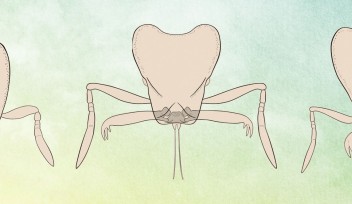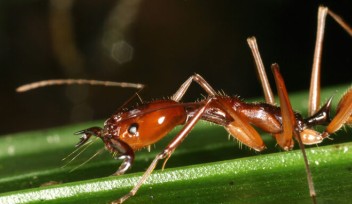[Listicle] It’s World Oceans Day! Dive into OIST’s marine science research through our most recommended articles!

June 8 is World Oceans Day, a day to celebrate the oceans and think about the challenges facing our planet's waters.
Our campus at the Okinawa Institute of Science and Technology (OIST) stands facing the beautiful ocean of Okinawa. The coastal waters are fringed with coral reefs which house a rich variety of life, and further out lie deep-sea hydrothermal vents that nurture unique and valuable ecosystems. Just a few kilometers away from campus, the coastline is bordered by rare mangrove forests.
However, like many places around the world, Okinawa’s marine ecosystems now face a variety of challenges caused by human-driven environmental changes. Coral reefs near the coastline are exposed to coastal development, mangrove forests have been turned into aquaculture farms and artificial shores, and rare earth mining is planned at deep-sea hydrothermal vents.
This unique natural environment of Okinawa and the challenges it faces provide many opportunities to researchers who aim to solve some of the world’s most pressing problems.
OIST offers a world-class environment for marine science research and education. At the OIST Marine Science Station in Seragaki, Onna Village, 13 research units are currently conducting research on a wide range of topics including climate change, genetics, and marine biophysics.
Here, we showcase some of our most recommended articles for you to read on 2023 World Oceans Day.
Our top 5 most popular articles on ocean-related research (English articles)
1. Okinawan Sea Grapes Reveal Secrets of Plant Evolution(2019)
Scientists have decoded the genome of the popular Okinawan seaweed “umi-budo” or “sea grapes,” which could help ease the crop’s cultivation and address environmental issues caused by the invasive spread of related species.
2. Okinawa Mozuku – The Treasure Under the Sea (2016)
Scientists have decoded the genome of Okinawa mozuku, a seaweed with healthy properties that plays a key economic and ecological role in Okinawa.
3. OIST to Harness Energy from Ocean Waves in the Maldives (2018)
OIST has signed a Memorandum of Understanding with the Ministry of Environment and Energy of the Republic of Maldives and Kokyo Tatemono Company Limited of Tokyo, Japan, to embark on a wave energy project in the Maldives.
4. Hard to swallow: Coral cells seen engulfing algae for first time (2021)
New research into the crucial partnership between coral and algae may one day help prevent coral bleaching.
5. Colorful connection found in coral’s ability to survive higher temperatures (2021)
A coral’s color can tell of its resilience to climate change, and a new study has shed light on the underlying genetic factors that may be at work behind this.
Our top 5 most recent ocean-related research articles
1. Can noisy and polluted coastlines harm baby fish?
OIST researchers aim to find out Less than 40% of Okinawa's coastline remains natural. An innovative coastal monitoring program investigates how human activity and development affects the health of juvenile fish living near the shore.
2. Detecting coral biodiversity in seawater samples
Researchers from OIST have developed a method to measure coral biodiversity by extracting environmental DNA (or eDNA) from a liter of surface seawater collected from above a reef. The technique paves the way for large-scale comprehensive surveys of reef-building coral to take place and removes the reliance of direct observations made through scientific scuba diving or snorkeling.
3. In hot water: Ocean warming impacts growth, metabolic rate and gene activity of newly hatched clownfish
The oceans are heating up, and just 3°C of warming could significantly impact the development and growth of clownfish larvae, a new study finds.
4. Tiny atoll in the Pacific Ocean offers glimpse into warmer world
A team of scientists travelled to Taiaro Atoll in French Polynesia to seek answers about the existence of a unique community of fishes.
5. New Insights into Chordate Body Plan Development Answer Long-Standing Questions on Evolution
The researchers looked into the evolution of chordate body plans, a key unanswered tenet of evolutionary biology, with more detailed information of gene expression patterns and developmental patterns.
Research teams (units) conducting ocean-related research at OIST
https://www.oist.jp/research/specialty/marine-science
- Biological Nonlinear Dynamics Data Science Unit (Assistant Professor Gerald Pao)
- Macroevolution Unit (Assistant Professor Lauren Sallan)
- Evolutionary Neurobiology Unit (Associate Professor Hiroshi Watanabe)
- Genomics and Regulatory Systems Unit (Professor Nicholas M. Luscombe)
- Marine Eco-Evo-Devo Unit (Professor Vincent Laudet)
- Marine Biophysics Unit (Associate Professor Satoshi Mitarai)
- Marine Climate Change Unit (Professor Timothy Ravasi)
- Evolution, Cell Biology, and Symbiosis Unit (Assistant Professor Filip Husnik)
- Nonlinear and Non-equilibrium Physics Unit (Professor Mahesh Bandi)
- Marine Genomics Unit (Professor Noriyuki Satoh)
- Complexity Science and Evolution Unit (Professor Ulf Dieckmann)
- Computational Neuroethology Unit (Assistant Professor Sam Reiter)
- Neuronal Rhythms in Movement Unit (Assistant Professor Marylka Yoe Uusisaari)














